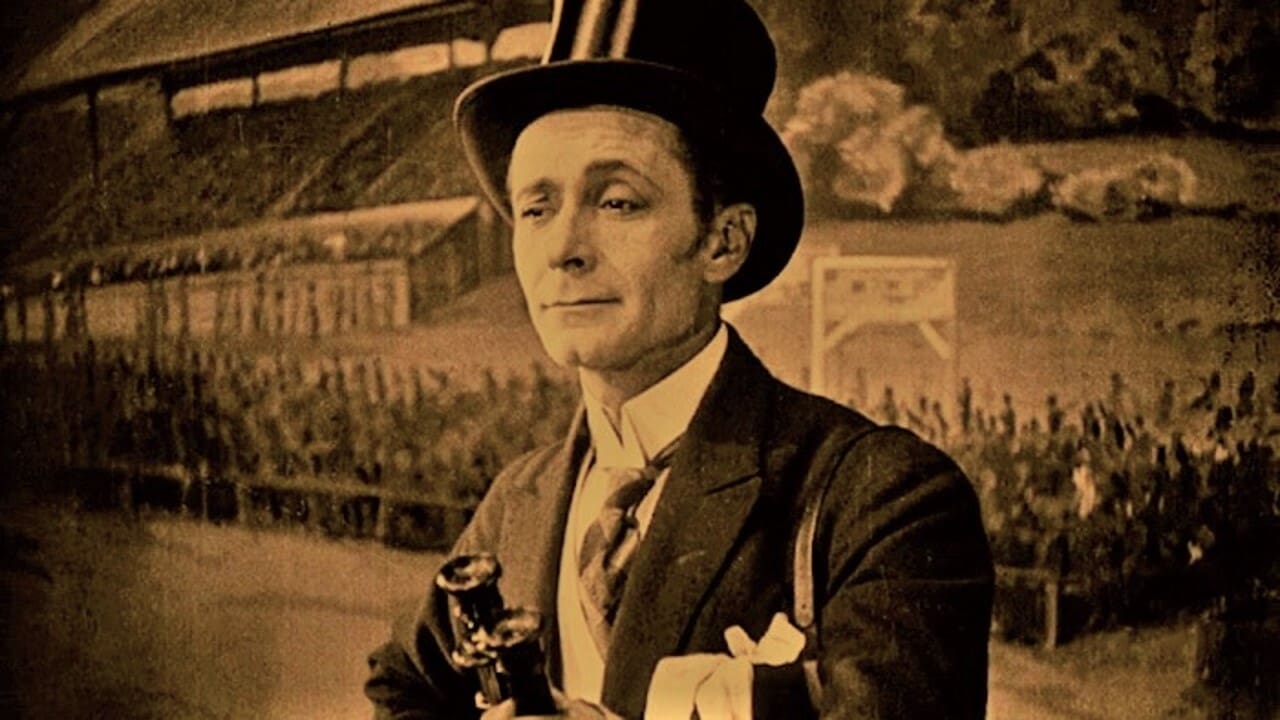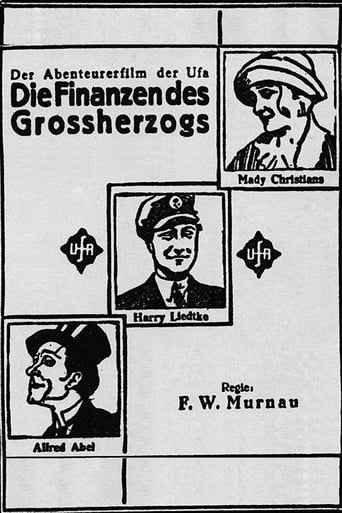

Friedrich Wilhelm Murnau (born Plumpe) is one of the most known filmmakers (maybe the number 2 behind Lang) from the glory days of German silent cinema and here we have a film from him that came out in 1924, so it's less than 10 years until this 80-minute movie will have its 100th anniversary. Murnau is mostly known for his take on dramatic films with a large number of scary horror elements. But this one here is a completely different film, be it in terms of story, tone or plot development. Yes there is a scene when some people want to kill somebody else, but this is nonetheless a really light movie with a couple (somewhat) funny moments during its entire runtime. So can Murnau deliver in terms of comedy too? Sadly, I must say no. Even for a film that stays easily under the 90-minute mark i must say that there just weren't enough entertaining moments and the entire story was not particularly interesting either. This is especially disappointing as the Frank Heller novel this film is based on was adapted by Fritz Lang's longtime collaborator Thea von Harbou. I am not saying this is a bad film and it is probably even better than most comedies from that era (not a prolific genre in the 1920s in Germany), but by today's standards "The Grand Duke's Finances" has not aged very well and that's why my final verdict is a thumbs-down. Not recommended.
... View MoreI am not sure silent films are still considered as a pilgrim's treasure among cinephiles, yet the frustrating truth is that one could never ever watch all the masterpieces he/she desires during one lifetime, the more I grow older, the more I cannot endure wasting my insufficient time on films neither harbor awful reviews nor cannot ignite my interest. Thus, I cannot help oscillating whether silent films should fall into the latter category or not. This film actually is my second silent film I have watched since a rather long time, the previous one is SUNRISE: A SONG OF TWO HUMANS (1927), Murnau's work as well, of which actually I am deeply fond. The major issue I cannot think highly of silent features is that without the voices from the characters, I feel literally detached from the story involved, which eventually will elicit some weariness of my attention on the screen, if it's a comedy, maybe the situation is better as long as all the gags function as expected, otherwise, if the plot is a tad complex, it will lose me quickly. Actually this is exactly what this film has done to me, but in a lesser extent, I failed to distinguish each and every character (no idea which one is the main villain, no idea what's the relationship between the professor and the princess Olga, just strangers or a couple indeed? Also the Chinese subtitle is lousy) and not well acquired what actually happened to the letter (what's its importance on earth?). The accompanying piano score overshadows the narrative outright (I remember taking a short but comfortable nap with it).The two-faced hue of the film (ochre and blackish green) could be the product after the film being restored, which serves favorably to remind audience be aware of the in-door/out-door milieu (have no idea it's an intentional contrivance or something later-decorated).Overall, compared with the utterly earnest SUNRISE, the film doesn't impress me too much, the basic proof is that as a comedy, I didn't generate any laughter from A to Z. Maybe the perversive but intriguing score should take the blame, and at least I feel so blessed thanks to the progress of technology, which has allowed the motion picture evolving into a more audience-friendly status as it is now (3D technology is excluded).
... View MoreThe Grand Duke of Abacco ( Herr Harry Liedtke ) is settled on a Mediterranean island living an altruistic, distracted and careful life. In reality, he's full of debts but that's a situation that could change thanks to an unexpected sulphur deposit found on his small duchy. The Duke, besides his financial problems, is threatened by his villainous principal creditor, who soon stirs up a plot. The dastardly plans count on some of his malicious subjects. Meanwhile other strange characters become involved in what and in will be a peculiar plot full of financial conspiracies and politics concerning the Grand Duke.Many geniuses in different Arts are also humans. So, due to this, they have virtues and defects. As it happens sometimes with inhuman aristocrats, their major virtues are their defects and minor sins from time to time are revealed. And believed or not, such human weakness was suffered also by the great German film director, Herr Friedrich Wilhelm Murnau, who directed in 1924 a comedy!!.Herr Murnau's only comedy, "Die Finanzen des Großherzogs" it is certainly a rare oeuvre in his magnificent career ( although it is possible to appreciate some slight signs of humour in previous films as "Schloß Vogelöd" - others Herr Murnau's early film are not well remembered by this German count... ) "Die Finanzen des Großherzogs" is a unique and special silent comedy piece stretching Herr Murnau's parameters in what certainly is a bizarre film dealing with idealized and romantic subjects developed in a caricaturized way.The story of the film is centered around the financial problems of the Grand Duke of Abacco. Together with the different characters involved in such odd story that Herr Murnau describes in a parallel way until little by little everyone comes together in what it is a special comedy of financial intrigue. It's a peculiar "totum revolutum" leading to an over-elaborated story.After having directed "Phantom" (1922) from a script written by Frau Thea von Harbou ( in turn taken from a dense novel by Herr Gerhard Hauptmann ), this time Frau von Harbou and Herr Murnau considered it necessary to select a completely different literary option than the previous one. The choice was a light novel by Herr Frank Heller that in its adaptation to the silent screen has as a result a mixture of folkloric and stereotyped elements with an air of modern serial.The film deals with idle and bankrupt aristocrats, a rich duchess, angry servants ( certainly, nothing new under the aristocratic sun ), blackmail, swindlers and even a Revolution. Everything is filmed in beautiful Yugoslavian places that give to the film an aesthetic aspect paralleling the story of the film in itself. That is to say, charming but at the same time irrelevant.., a Herr Murnau "divertimento", certainly."Die Finanzen des Großherzogs" is a transitional experiment, an exception in Herr Murnau's superb silent career than in spite of its flaws has interest for any silent fan. It should be watched and considered simply as a weird and peculiar comedy of financial intrigues, a decadent passtime, ja wohl!.And now, if you'll allow me, I must temporarily take my leave because this German Count must flee from his debts. Herr Graf Ferdinand Von Galitzien
... View MoreAny film directed by F.W. Murnau merits serious attention, but "The Grand Duke's Finances" is especially noteworthy because it's one of Murnau's rare attempts at comedy. Based on this one film (the only Murnau comedy I've seen to date), Murnau's comedic skills were far less developed than his flair for drama and melodrama. However, there are some good points throughout this film.The plot is not especially credible nor especially funny, and each chapter of the story is prefaced with an introductory title which (except for the climactic one) features a long, long description of who these people are and what they mean to accomplish.The best performance in the film is given by Alfred Abel. I've seen Abel in a few other comedies, and I usually find him stolid and stiff. Here, surprisingly, he's quite funny as a wealthy eccentric who resorts to various scams and false identities to enrich himself even more. Wearing long sideburns and an unusual makeup, in this film Abel looks remarkably like Eddie Foy Junior! Abel also gets the funniest dialogue in the film, courtesy of the silent intertitles. When beautiful Mady Christians wants to evade her pursuers, Abel deftly makes her look extremely unattractive and then he remarks: "This is how I expect my wife to look." When she faints at Abel's table in a bistro, he suavely asks the waiter for a glass of cognac, apparently to revive her ... and then Abel drinks it himself. I anticipated as much, but then Abel uses the cognac's lingering fumes to revive her.Although long stretches of this comedy are unfunny, nevertheless "The Grand Duke's Finances" contains the earliest example I've ever encountered of a perennial sight gag that I call "the punctuated stampede". We've all seen this gag in dozens of cartoons: a mob of figures rush across the screen, followed by a pause, and then one last little straggler brings up the rear. In this film, for no discernible reason, a top-hatted Abel contrives to send a pack of wolfhounds racing through his own mansion ... with a little dachshund bringing up the rear to punctuate the stampede.In the central role of Don Ramon the Twenty-Second, Grand Duke of the Mediterranean nation of Abacco, Harry Liedtke is only vaguely amusing. Fans of "Nosferatu" will be intrigued to see Max Schreck's name in the cast list here. Schreck plays one of a quartet of political agitators. He wears a long straggly beard and looks impressively gaunt but has almost nothing to do, except for one amusing bit of physical business when a maidservant chases him out of the Grand Duke's castle. A far more impressive (and much more physical) performance is given by Hans Schaufuss as Schreck's hunchbacked co-conspirator. Schaufuss leaps, capers, goggles at the camera, swings from a rope, and gives a performance even more athletic than Lon Chaney's Quasimodo.The exterior photography is excellent, and I felt a nostalgic twinge during a shot of a tram moving through a city's streets at night. Several sequences were shot on shipboard, and I was pleased to see the horizon heaving up and down realistically, unlike in so many Hollywood films which feature stationary cameras in "shipboard" sequences. Near the end, there's a funny shot of a woman chasing a man into the distance ... but Leo McCarey would have done it better. Murnau was a great director of dramas, but his comedic efforts fall very far short of Ernst Lubitsch's comedies. I'll rate "The Grand Duke's Finances" 6 out of 10.
... View More